There are several options to consider where you want to drill a hole into concrete, and for anything larger than 1-2” diameter you will probably want to consider using some form of a core drill bit. Of course, not all concrete core drill bits are created equal, and selecting the right core bit will depend greatly on the type of concrete material, depth, wet vs. dry and specific application. We will take a very quick look at the different types of core drills and core bits available.
SDS-Plus Rotary Hammer Drill & Carbide Core Bits
This will probably be the least expensive and also the most limiting option but the SDS Rotary Hammer is a very common tool available on most jobsites, so it is often the go-to choice. The SDS-Plus core bits use multiple carbide cutting segments to pound the concrete into dust (drill used in rotate & hammer mode) and take it away. This type of drilling is done dry so it creates a good amount of silica dust but no wet slurry mess to deal with. This is a good option for concrete block walls but will not perform well in poured concrete. The bit will simply overheat if used in deep concrete or other dense materials, at which point it will degrade very quickly. Also, they are relatively shallow with only about 2” of drilling depth.
The motors on these hammers are fairly small, so the bits are often thin wall and range in size from 1” to as high as 4-3/8” but we would definitely recommend a high performance SDS drill like the Bosch Bulldog Xtreme RH228VC or Bosch RH328VC.
As for the SDS core bits themselves, there are 2 types of setup: one with a carbide pilot drill bit and the other with just a guide pin/plate. The pilot bit option drills right through and keeps entire core more centered. It is also harder to remove the cut out material from the bit and possibly over-drills into material you don’t want to hit. With the guide pin/plate the hole is started then the guide pin/plate is removed and the hole is completed without additional guidance. This does make removing the cut away material easier and doesn’t require replacing the carbide pilot as often. However, the guide pin/plate is easier to misplace and you need to be more careful when drilling without a pilot.
Large Grinder & Dry Diamond Core Bits
This is another very good option for concrete block walls but should definitely not be looked at as an alternative to wet core drilling. A larger 7” or 9” grinder should be used because of the slower RPM and more torque needed to power these bits. With the dry diamond core bit (up to 6”) in this setup the bit grinds the concrete, not pounding it like a hammer drill so the holes will actually be much cleaner with less chance of blowout on the backside.
The temptation to use these bits for poured concrete walls is very high because of the 9”+ drilling depth but the dangers of running these bits dry in that type of application are very high. These bits are almost identical to the wet diamond bits but with a thin wall design so they will overheat very quickly if not given enough fresh air and time to cool. These core bits can be used wet as well to keep them more cool which we would recommend if that is a safe option.
SDS-MAX & Spline Rotary Hammer Drills & Carbide Core Bits
This setup is very similar to the carbide core bits with the SDS-Plus but uses a larger Spline or SDS-MAX rotary hammer drill. The bits themselves are also deeper (3”+) and have thicker wall with wider carbide inserts. These bits again work terrific in block walls and while it is very tempting to use them in solid concrete as well, they are really not intended for that kind of use. This kind of prolonged deep drilling will easily overheat the bit to the point it will significantly decrease wear life. These bits aren’t cheap (none of them are) so our guess is you’ll be pretty frustrated if you end up burning up your bit after only a few uses.
These larger carbide core bits also come in two types with a pilot drill bit and a guide pin/plate version. Our personal preference is the guide pin/plate set up because we’ve gotten the remaining cut concrete jammed in the bit a few to many times. We’ve also seen guys bash these bits against the ground to get the core out (our guess would be those bits were being billed to the job) which of course makes them warp, crack and wear out prematurely.
Core Drill & Wet Diamond Core Bits
For most applications in solid concrete this is going to be the best way to drill your holes. For holes up to 3” diameter a hand held core drill like the Weka DK12 ($1497, Ohio Power Tool) or Eibenstock END 130/3 ($1229, Ohio Power Tool) are very easy ways to go with little setup time. For larger diameters up to 14”, a core rig like the Diamond Products Core Bore M1 ($1950, with Milwaukee 20A motor) is the way to go, but it will certainly require a lot more setup time to anchor down.
No matter what diameter the standard length of a wet bit will give you about 12” drilling depth (much longer if special ordered) which means it will easily pass thought poured concrete walls. These bits will need to be run wet, which certainly can create a new set of issues if working in, say, a finished basement or other sensitive spaces. There are some simple slurry containment options such as the Bit Buddy 1-4” or 4-8” as well as a host of other products, but odds are you are still going to make some mess. With proper usage even though the Diamond Core Bits can be pretty pricy this really is often the most economical option when averaging cost over many holes.
So which Core Bit is Right for You?
That’s a loaded question for sure. Of course we don’t all live in a perfect world where we have the absolute right tool and bit for every specific job. If you already own a large SDS-Max rotary drill and a 3” carbide core bit from a previous job, could you get through a poured wall with a fairly clean hole? Sure you could, it’s just not recommended. We are not the core bit police, we just wanted to highlight some of the different options and recommended usages so you know if you are over using your tool/bit to be careful. If you have any questions about core bits and drills you can always call a pro at Ohio Power Tool 800-242-4424 and they can guide you to the best options.
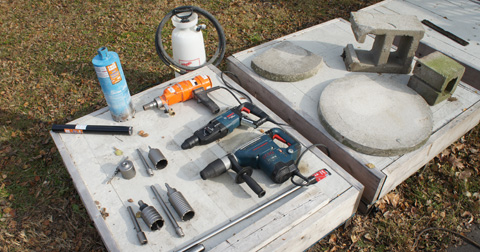
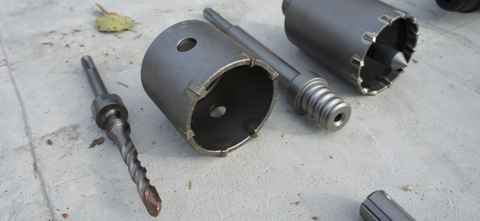
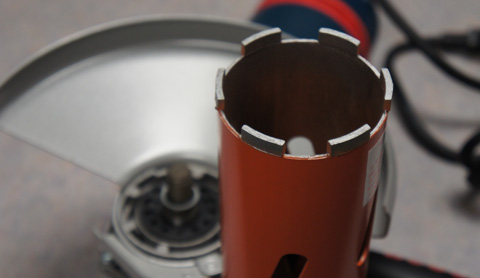
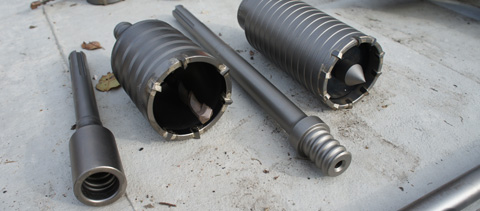
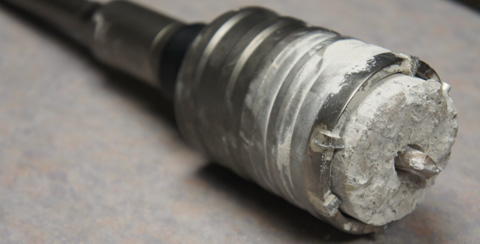
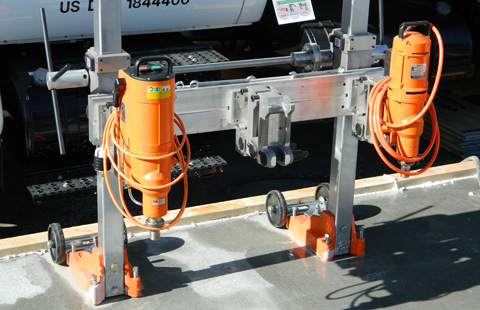
I conceive this internet site contains some rattling great information for everyone : D.